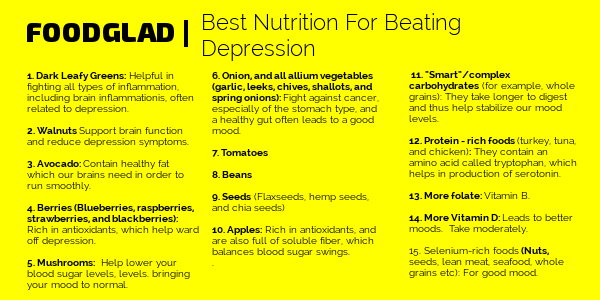Healthy Food List #11: Best Nutrition For Beating Depression
Food list
1. Dark Leafy Greens: Rich in vitamins A, C, E, and K, minerals and phytochemicals. Helpful in fighting all types of inflammation, including brain inflammation, which studies say, is often related to depression.
2. Walnuts: Rich in omega-3 fatty acids, which support brain function and reduce depression symptoms.
3. Avocado: They contain healthy fat (oleic acid, a monosaturated fat), which our brains need in order to run smoothly. Three-fourths of the calories of an avocado are from fat, mostly . An average avocado also contains 4 grams of protein, higher than other fruits, and is filled with vitamin K, different kinds of vitamin B (B-9, B-6, and B-5), vitamin C, and vitamin E-12. Finally, they are low in sugar and high in dietary fiber, containing about 11 grams each.
4. Berries (Blueberries, raspberries, strawberries, and blackberries): Rich in antioxidants, which help ward off depression.
5. Mushrooms: They fight against insulin, which helps lower your blood sugar levels, levels. bringing your mood to normal (neither high or low) evening out your mood. Mushrooms are also probiotic, which increases healthy gut bacteria, and healthy gut and healthy brain are closely related.
6. Onion, and all allium vegetables (garlic, leeks, chives, shallots, and spring onions) : They contain anti-inflammatory flavonoid antioxidants that fight against cancer, especially of the stomach type, and a healthy gut often leads to a good mood.
7. Tomatoes: Contain lots of folic acid and alpha-lipoic acid, which help fight depression, by preventing excess of homocysteine, a chemical which restricts the production of important neurotransmitters like serotonin, dopamine, and norepinephrine, from forming in the body.
8. Beans: Our bodies digest them slowly, thus stabilizing our blood sugar levels.
9. Seeds (Flaxseeds, hemp seeds, and chia seeds): Contain omega-3 fatty acids, which increases the absorption of protective nutrients in vegetables eaten at the same meal.
10. Apples: Rich in antioxidants, and are also full of soluble fiber, which balances blood sugar swings.
11. "Smart"/complex carbohydrates (for example, whole grains): All carbohydrates are linked to serotonin, the mood-boosting chemical, but complex carbohydrates are an healthier alternative. They take longer to digest and thus help stabilize our mood levels.
12. Protein - rich foods (for example, turkey, tuna, and chicken): They contain an amino acid called tryptophan, which helps in production of serotonin.
13. More folate: Studies have shown that people who take less folate (found in the Mediterranean diet - legumes, nuts, many fruits, and dark green vegetables) tend to be more depressed than others. A reason for that is lack of enough Vitamin B.
14. More Vitamin D: Leads to better moods. But not too much of Vitamin D, people.
15. Selenium-rich foods (Nuts, seeds, lean meat, seafood, whole grains etc): People with good selenium levels tend to have a good mood.